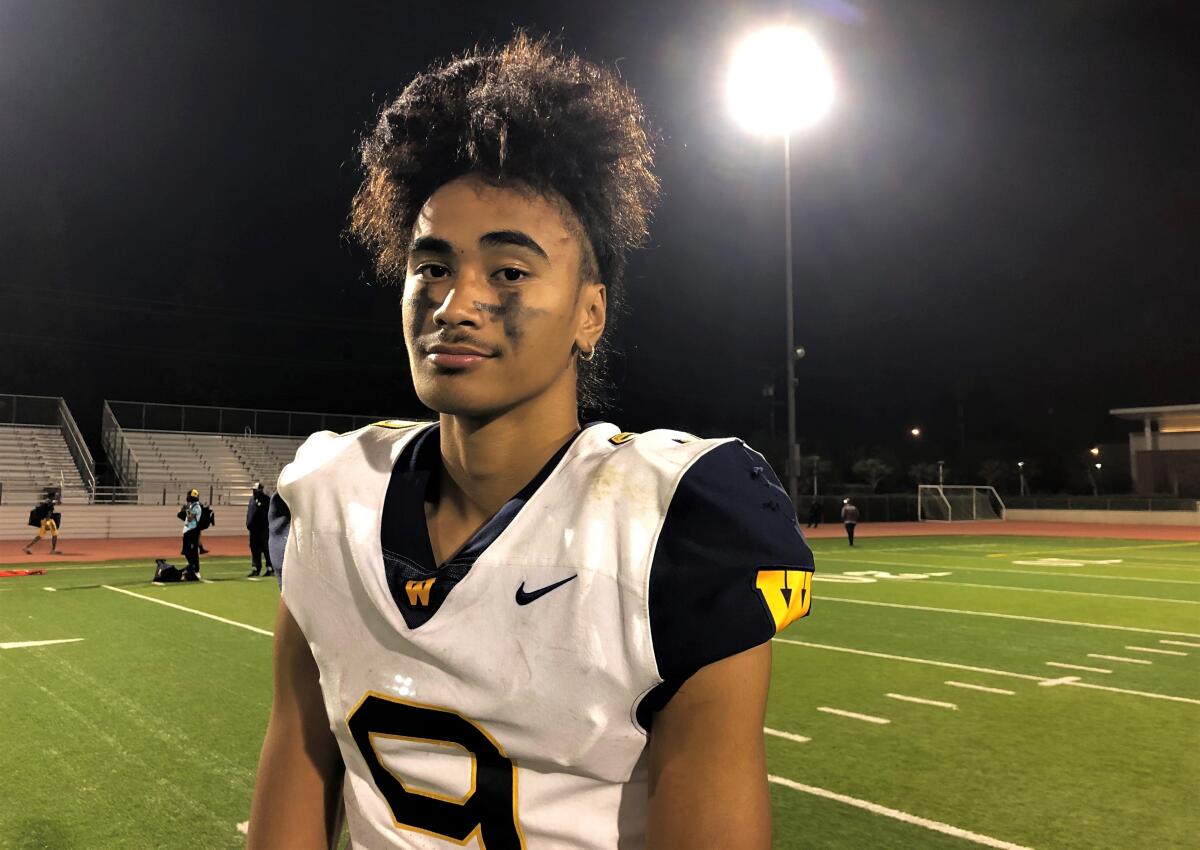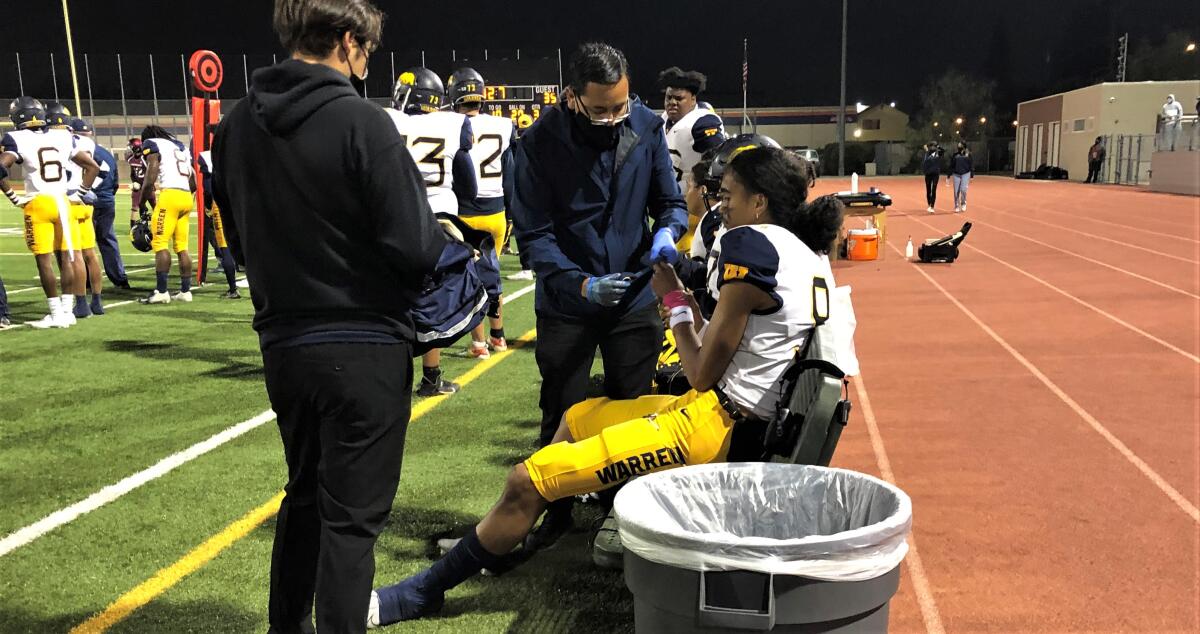Warren’s Nicholaus Iamaleava brings toughness to quarterback play

- Share via
Nicholaus Iamaleava Jr. didn’t notice the blood dripping down his arm.
The Downey Warren High quarterback was jogging off the field after a goal-line drill at the end of a Thursday practice — the day before his team’s first game of the season March 19 against Compton Dominguez — having just stiff-armed a teammate on defense who’d tried to prevent him from getting into the end zone. Warren coach Kevin Pearson saw something was wrong with the sophomore’s left, non-throwing index finger.
“We go over to the trainer, and the trainer meets me and goes, ‘Coach, that’s his bone right there,’” Pearson said. “I go, ‘What?’ He goes, ‘Yeah, that’s a compound fracture.’”
He was supposed to be out for four to six weeks, doctors initially said. Instead, Iamaleava sought consultation after consultation until he was cleared to play in the middle of a Wednesday practice the following week. He laced up his cleats, taped up his fingers and participated in the last half of that day’s drills and the next day’s walk-through.
Then he suited up March 26 and threw for 361 yards and six touchdowns in a 40-20 win over Lakewood Mayfair.
“He’s one of the toughest kids I’ve ever coached, and in a position where you don’t get a lot of tough kids,” Pearson said. “He’s just different. His mentality is different.”
Get our high school sports newsletter
Prep Rally is devoted to the SoCal high school sports experience, bringing you scores, stories and a behind-the-scenes look at what makes prep sports so popular.
You may occasionally receive promotional content from the Los Angeles Times.
There’s a grit to the 6-foot-6 Iamaleava, a grit belied by a carefree smile and gangly frame that glides more than it walks. It’s a grit, according to him, that exists in his DNA, passed down from generation to generation.
Iamaleava grew up in a Samoan household with strict, no-nonsense values imposed by his father, Nicholaus Sr., an assistant coach for Warren. Samoan blood, they say, carries strength.
“We’re warriors,” Iamaleava’s father said. “That’s where [the toughness] is from. And it shows.”
Yet as well as that value has lent itself to sports such as football — players of Polynesian heritage are extremely prevalent in the NFL — Iamaleava doesn’t have many role models at his position to turn to. He wants to be a “trendsetter,” he said.
“What Samoan quarterbacks do you see out there? It’s only Tua [Tagovailoa], and maybe a few [others],” Iamaleava said.
That dream is buoyed by the strength of the 15-year-old’s right arm. Watching Iamaleava wind up to throw a deep ball is akin to watching a lightning bolt erupt from one’s shoulder. His release is compact, yet violent, buoyed by the power of a strong base. He stays composed when throwing on the run, a trait Pearson attributes to Iamaleava’s dual-sport status as an elite volleyball player.
“His arm strength is better than any 15-year-old kid I’ve ever seen,” Pearson said.
Iamaleava also tries to set himself apart with his preparation. This is just the sophomore’s first year with Warren’s program after transferring from Long Beach Poly, but Pearson has been impressed with the quarterback’s ability to translate concepts from the film room to the field.

Highlights of Nicholaus Iamaleava, a 6-foot-6 quarterback from Warren High in Downey.
That intelligence was apparent in Warren’s third game of the season, a 35-6 victory over Paramount on Friday night.
In the first half, contrary to the “fireworks show” of his first game, as Pearson put it, Iamaleava was struggling to move the ball. A few minutes into the second quarter, with Warren clinging to an 8-0 lead, he strode off the field and banged his helmet into the turf in frustration. Even as the lead extended to 15-0 before the half, he was a restless ball of energy, pacing back and forth along the sideline during defensive possessions and cradling a football under his arm like a newborn baby.
Paramount was dropping its secondary 20 yards from the line of scrimmage, Iamaleava said, nixing any threat of a deep ball that had carved up Mayfair the week before. At halftime, the young signal-caller called for adjustments.
“I told Coach [Pearson], ‘Let’s take all the short stuff first and have them come down, and then it opens up the big stuff,’’ Iamaleava said. “It really just came down to taking what the defense gave me.”
After halftime, Iamaleava connected on a variety of dump-offs, screens and crossing routes in adding three touchdown drives to increase Warren’s lead. Yet as he fired a pass up the seam for a score late in the third quarter, Iamaleava caught his fractured finger on the helmet of a Paramount lineman, walking off the field grimacing.

With his father, teammates and Pearson watching in a semicircle on the sideline, a Warren trainer gingerly unwrapped Iamaleava’s taped hand. Pearson bent down to talk to his quarterback, suggesting he sit out the rest of the game.
“No coach, I’m good!” Iamaleava protested. “It’s the fourth quarter!”
Offensive lineman Joseph Perez, sitting next to Iamaleava on a rusty green bench, leaned over.
“We’re up 35-0,” Perez said.
Eventually, Pearson persuaded Iamaleava to take the rest of the night off.
“I mean, that’s him. That’s Nico,” Pearson said after the game. “You’d probably have to cut his right arm off for him to not be able to play.”
That finger might well be taped the rest of the season. But Iamaleava has goals of representing his heritage that are bigger than a fracture.
“Putting our culture on the map with getting guys in playing skill positions — we’re known for what, linemen, right? Big linemen?” Iamaleava said, when asked his thoughts on the importance of his heritage. “Showcasing my skill and what I can do at quarterback and just repping our culture.”
More to Read
Get our high school sports newsletter
Prep Rally is devoted to the SoCal high school sports experience, bringing you scores, stories and a behind-the-scenes look at what makes prep sports so popular.
You may occasionally receive promotional content from the Los Angeles Times.






